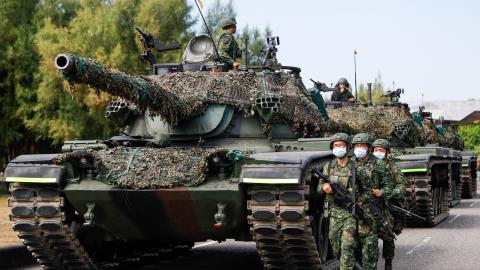The Albanese government’s Defence Strategic Review was prepared on the basis that our defence forces need to better contribute to the collective security of the region. This includes deterrence or, if that fails, war.
The most likely theatre of conflict in the foreseeable future is the Taiwan Strait. If the US comes to Taipei’s assistance, Australia will not necessarily follow. But that option must be left open.
This means China is forced to consider the possibility that the US and allies such as Japan and Australia will lead a collective effort against the People’s Liberation Army. It will vastly complicate matters for the PLA and cause Beijing to recalculate whether a successful invasion of Taiwan is possible, or if the cost of doing so is prohibitive.
A basic first principle is that if you don’t help yourself, then do not expect others to come to your assistance. In a trip to Taipei to meet with their senior political, bureaucratic and strategic leaders last week, it was clear this lesson from the Russian invasion of Ukraine is being absorbed. If China can overrun Taiwan with only minimal resistance, then others will not rally to the defence of these islands.
The will and ability to resist is material and human. The former refers to the military capacity of Taiwan and its ability to absorb economic pressure. In this context, credit must go to the Biden administration. It has begun a proper conversation with Taipei about changing its military structure and posture to advance what planners refer to as a strategy of denial; that is, a defensive strategy that makes it prohibitively difficult for China to achieve its objectives through military force. This means quick and relatively cheap ways to impose costs on a possible invading force.
Regarding economic resilience, Taiwan has felt the pressure of selective Chinese sanctions for several decades. There is no way to fully China-proof one’s economy. But, like Australia, it is pursuing an economic diversification strategy. In June last year, Taiwan and the US announced their Initiative on 21st-Century Trade, which aims to conclude an economic agreement consistent with the high standards in the Comprehensive and Progressive Agreement for Trans-Pacific Partnership. Taiwan also has applied to become a member of the CPTPP. Japan already has expressed strong support for Taiwan’s application. Australia’s formal position is that it will assess applicants on technical grounds such as whether they meet institutional, environmental and labour standards. Taiwan would very likely meet these standards.
The reality is that the decision to admit or deny membership will come down to a geopolitical calculation. The temptation for China to use force is higher if the economic and institutional relevance of Taiwan decreases. This is precisely what Beijing is trying to achieve by seducing or coercing other countries to reduce interactions with Taiwan. Since deterring China from using force has become one of our primary objectives, helping to increase Taiwan’s regional and international relevance ought to be an urgent priority. China will rail against any nation supporting Taiwanese membership in the CPTPP but admitting Taiwan makes good technical and geopolitical sense.
It is the human element of deterrence that has seen remarkable progress in Taiwan. In an authoritative poll result released by the National Chengchi University late last year, more than 70 per cent of adults surveyed stated they were prepared to fight to defend Taiwan. This is consistent with numerous other surveys. More than just sentiment, there is serious thought being given to how to organise grassroots resistance movements should this terrible need arise.
Relentless Chinese transgressions into Taiwanese maritime and air space and large-scale coercive military exercises following high-profile events such as the visit last August by then US House of Representatives speaker Nancy Pelosi and President Tsai Ing-wen’s meeting with incumbent Speaker Kevin McCarthy this month are hardening public Taiwanese resolve to defend their way of life. That strengthens deterrence.
Finally, the Australia-Taiwan bilateral relationship remains underdone. It is our sixth-largest trading partner. The inherent value and example of its democracy in a region where there is a genuine contest of liberal and authoritarian values and practices occurring should be better appreciated. Some point to our one-China policy, which does not recognise Taiwan as a sovereign state, as an obstacle.
But there is vast freedom for us to define the contours of what one-China means rather than allow Beijing to define these contours for Australia. Our one-China policy does not preclude support for Taiwan joining the CPTPP. After all, Taiwan is a member of the Asia-Pacific Economic Co-operation grouping. Unlike other Quad members in the US, Japan and India, there is no defence attache in the Taiwanese Representative Office in Canberra. This seems curious given the seriousness with which we are preparing for a Taiwan Strait crisis and contingency. If deterring China is the objective, then more, rather than less, interaction with Taiwan ought to be a priority.

















